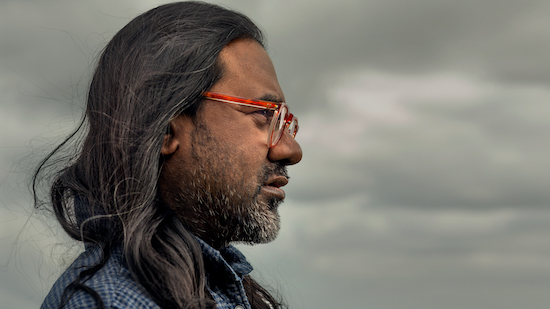During his day job in the Dance Promotions division of Sony Records in the 90s and early 00s, author Niven Govinden kept a keen eye on the metamorphosis of artists as they turned into stars. He worked music by premium divas Mariah Carey, Da Brat and the now infamous Naomi Campbell record, Babywoman, the model’s first and last. One of his charges, at the starting blocks of their career was the nascent Destiny’s Child. “You’d watch them ascend quickly,” he says, “see how their lives change, how they change when stardom happens. When you go out with artists and you’re stood in a back room before they go out to promote themselves, you see that perceptible shift as they become the persona.”
That chrysalis moment forms one profoundly moving thread woven through Govinden’s masterful sixth novel, Diary Of A Film. The book has won him an army of new readers and a royal flush of glowing notices. “No complaints this time, people seem to really get it,” he says, “and I usually have a whole list of them”. An interior, truthful and volubly uncynical analysis of why art is made and the shortcomings of those make it, the novel follows a European arthouse director over the weekend of debuting his new film to an Italian film festival. Added to the deft blur between art and life, his young leads, two rising Hollywood names have fallen in love onset. “It’s about all the unspoken things in the life of making work.”
Because of the location of the film and diagnostics of the actor’s star power, the reader could be forgiven for finding something of director Luca Guadanigno and his breakout stars, Timothee Chalamet and Armie Hammer in Call Me By Your Name between the lines of the novel. But as Niven points out, those recent star-crossed screen lovers have precedent. “Actually, I was thinking more of River Phoenix and Keanu Reeves in My Own Private Idaho, Matt Damon and Ben Affleck in Good Will Hunting, Heath Ledger and Jake Gyllenhaal in Brokeback Mountain. There are those moments in different epochs.”
An avid, articulate pop-cultural sponge as a kid, with a devoted love of music, a nose stuck in the pages of i-D and a subsequent, storied journey through London nightlife, Govinden’s authorial ambitions developed young. “I was 15 when I first found the screenplay for Hanif Kureishi’s My Beautiful Launderette,” he says “and in swift succession, I was reading Hubert Selby Jnr’s Last Exit To Brooklyn, Kathy Acker and loads of interesting queer writing. The penny dropped, that I can do what they do.”
A Goldsmiths film graduate, his working life has always revolved around telling stories, of one sort or another. “When I was younger, I wanted to be a polymath, at that age when you have the ego to think you can be. But I knew at the same time that I would never make a film, even when I was at Goldsmiths, because I am just not a collaborative person. The beauty of writing was that it’s literally my own version of my own way of doing things.”
Govinden’s writing life began in earnest as he was preparing his full-time exit from the music industry. The crossover was delicately marked by his brilliant debut, We Are The New Romantics, published in 2003. In a succession of novels since, delivered across the experimental spectrum – Diary Of A Film has no paragraph breaks, expediating the reader into the dichotomous mind of the director – he has built an impressive niche all of his own, underpinned by the curiosity to investigate why and where people fit in, how they allow themselves self-expression.
“This is quite a loving book, in a way,” he notes. “Everyone has a very personal reaction to it. It’s about film and film gives you this capacity to fall into your own interior life. You never know what environment your book’s going to arrive into. Where we are right now, people are so desperate to escape. There is this need to be somewhere that isn’t here. To access that kind of freedom.”
Niven Govinden’s Diary Of A Film is out now, click on his photo below to begin reading the Baker’s Dozen selection


